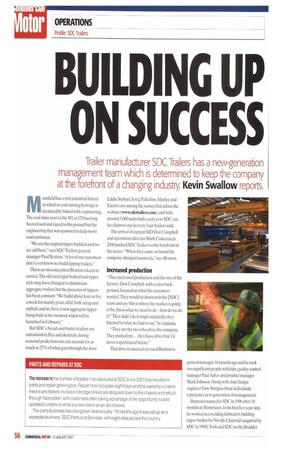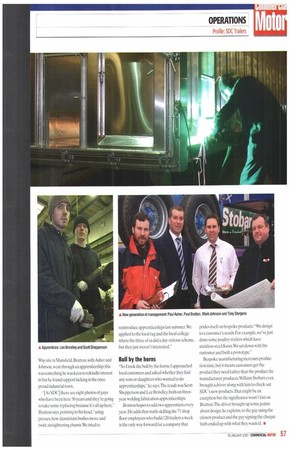BUILDING UP ON SUCCESS
Page 56

Page 57

If you've noticed an error in this article please click here to report it so we can fix it.
Trailer manufacturer SDC Trailers has a new-generation management team which is determined to keep the company at the forefront of a changing industry. Kevin Swallow reports.
Mansfield has a rich industrial history in which its coal-mining heritage is inextricably linked with engineering. The coal mine next to the M1 at J29 has long been closed and razed to the ground but the engineering that was spawned to help move coal continues.
"We are the original tipper builders and we are still here," says SDCTrailers general manager Paul Bratton."A lot of our customers don't even know we build tipping trailers."
This is an misconception Bratton is keen to correct.The old steel rigid-bodied coal tipper style may have changed to aluminium aggregate trailers, but the presence of tippers has been constant: "We build about four or five a week for mainly grain, offal, bulk, scrap and asphalt, and we have a new aggregate tipper being built at the moment which will be launched in February."
But SDC's bread-and-butter trailers are eurtainsiders, flats and sk eletals; during seasonal peaks boxvans can account for as much as 25% of what goes through the door. Eddie Stobart,Ford, Palletline, Marley and Electro are among the names that adorn the website (www.sdetrailers.com), and with around 5,000 units built every year SDC can lay claim to one in every four trailers sold.
The arrival of current MD Don Campbell and operations director Mark Cuskeran in 2000 pushed SDCTrailers to the forefront of the sector. "When they came on board the company changed massively," says Bratton.
Increased production They increased production and the size of the factory; Don Campbell, with a sales background, focused on what the customers wanted.They would sit down with the [S DC] team and say 'this is where the market is going to be, this is what we need to do how do we do it?' They didn't do it single-mindedly, they listened to what we had to say," he explains. "They are the two who drive the company. They pushed me... they have drive that I'd never experienced before."
That drive to succeed elevated Bratton to general manager 18 months ago and he took two significant people with him: quality control manager Paul Asher and product manager Mark Johnson.Along with chief design engineerTony Sturgess these individuals represent a new generation of management.
Bratton returned to SDC in 1996 after 18 months at Montracon. In his first five-year stint he worked as a welding fabricator, building tipper bodies for Neville Charrold (acquired by SDC in 1994),York and SDC on the Bradder Way site in Mansfield. Bratton,withAsher and Johnson, went through an apprenticeship; this was something he was keen to rekindle interest in but he found support lacking in the once proud industrial town.
"[At SDC] there are eight photos of guys who have been here 30 years and they're going to take some replacing because it's all up here, B ratton says, pointing to his head,"using presses. how alumini urn bodies move and twist, straightening chassis.We tried to reintroduce apprenticeships last summer. We applied to the local rag and the local college where the three of us did a day-release scheme, but they just weren't interested."
Bull by the horns
"So I Look die hull by the horns. I approached local customers and asked whether they had any sons or daughters who wanted to do apprenticeships," he says.The result was Scott Shepperson and Lee Brindley,both on threeyear welding fabrication apprenticeships.
Bratton hopes to add two apprentices every year. He adds that multi-skilling the 71 shop floor employees who build 120 trailers a week is the only way forward for a company that prides itself on bespoke products:"We design to a customer's needs. For example, we've just done some poultry trailers which have stainless-steel floors. We sat down with the customer and built a prototype."
Bespoke manufacturing increases production time, but it means customers get the product they need rather than the product the manufacturer produces.William Stobart even brought a driver along with him to check out SDC's new products.That might be an exception but the significance wasn't lost on Bratton.The driver brought up some points about design, he explains, so the guy using the chosen product and the guy signing the cheque both ended up with what they wanted. •






















































































































































































